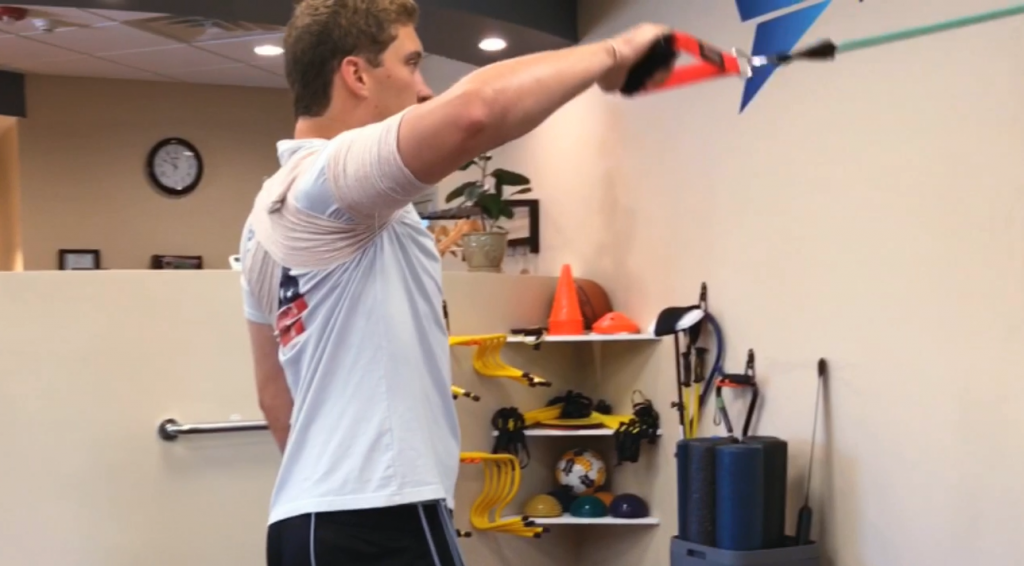Overview: Severe Golfer’s Elbow (Medial Epicondylitis)
Tendons are soft connective tissues that link bones to muscles.
The medial epicondyle is a bony bump present at the protruding end of the elbow joint. It’s a sensitive spot, surrounded by a group of muscles and tendons that connect the bones. They support joint movement and body motions such as gripping, lifting, bending, pulling, etc.
Golfer’s elbow (medial epicondylitis) occurs due to the overuse of these tendons. Repetitive movements and excessive stress on the joints lead to irritation and inflammation. In turn, this initially develops into elbow pain felt inside the joint. Without golfer’s elbow physical therapy treatment, the pain can spread down to the forearm and wrist.
Severe golfer’s elbow might lead to stiffness, reduced range of motion, and consistent pain in the affected area. In severe cases, the tendons might tear away from the bones, causing complete immobility.
Our personalized golfer’s elbow physical therapy sessions mitigate this risk by restoring muscle strength and flexibility and reducing pain.
Symptoms
Typical symptoms of medial epicondylitis include:
- Localized tenderness
- Elbow pain or burning sensation on the inside of the elbow
- Radiating pain (or tingling feeling) originating from the medial part of your wrist or forearm
- Weakened grip strength
- Inability to perform pulling, lifting, and gripping activities/ tasks
- Stiffness in the elbow joint
- Reduced range of motion
- Inflammation/swelling felt in the affected elbow
These symptoms increase gradually, leading to chronic pain and severe issues in performing everyday activities. For instance, turning knobs and holding and/or lifting objects might become difficult for people with medial epicondylitis.
Causes
Despite popular belief, golfer’s elbow can occur even if you do not engage in the sport. Leading causes of muscle strain include repetitive movements and overuse of the elbow joint due to:
- Occupational tasks (i.e. lifting heavy objects, carpentry work, painting, typing)
- Recreational activities (i.e. gardening and painting)
- Athletic activities involving throwing, lifting, and gripping equipment such as a golf club
- Acute wrist flexor injury caused by overuse of the elbow joint in a short time
Golfer’s Elbow Physical Therapy Diagnosis
Medial epicondylitis treatment begins with an initial assessment to determine the leading cause of the condition and form a diagnosis. This includes a series of questions related to your medical history and current symptoms. Our physical therapists will ask you about the intensity and frequency of elbow/wrist pain and how it disrupts activities of daily living (ADL).
Besides this, we conduct a detailed physical examination to observe wrist, elbow, and hand mobility, joint strength, and flexibility. We use the acquired information to develop an individualized golfer’s elbow treatment plan.
Golfer’s Elbow Treatment Plan

Our personalized medial epicondylitis treatment program involves a mix of onsite physical therapy and at-home exercises.
Manual physical therapy for golfer’s elbow includes soft tissue massage for pain relief, manual stretching, and gentle joint movements. Each technique’s main objective aims to restore lost hand mobility, boost elbow joint strength, and improve the range of motion.
Our physical therapists will use the comprehensive diagnosis and your daily routine to select a customized home care program. Typical exercises include resistance, isometric, and strengthening exercises. We focus on strengthening affected muscles and maximizing tolerance levels.
After your symptoms improve, we move onto functional physical therapy for golfer’s elbow. It involves exercises and golfer’s elbow physical therapy techniques that restore the prior level of functioning. Additionally, you will learn how to modify movements and alter gripping techniques. This will allow you to reduce the strain placed on medial tendons when you resume routine activities.
As a result, we can mitigate the risk of relapse and recurring elbow pain and accelerate the natural recovery process.
Do you want to know more? Contact us or call 201-773-8851 to book an appointment today.

